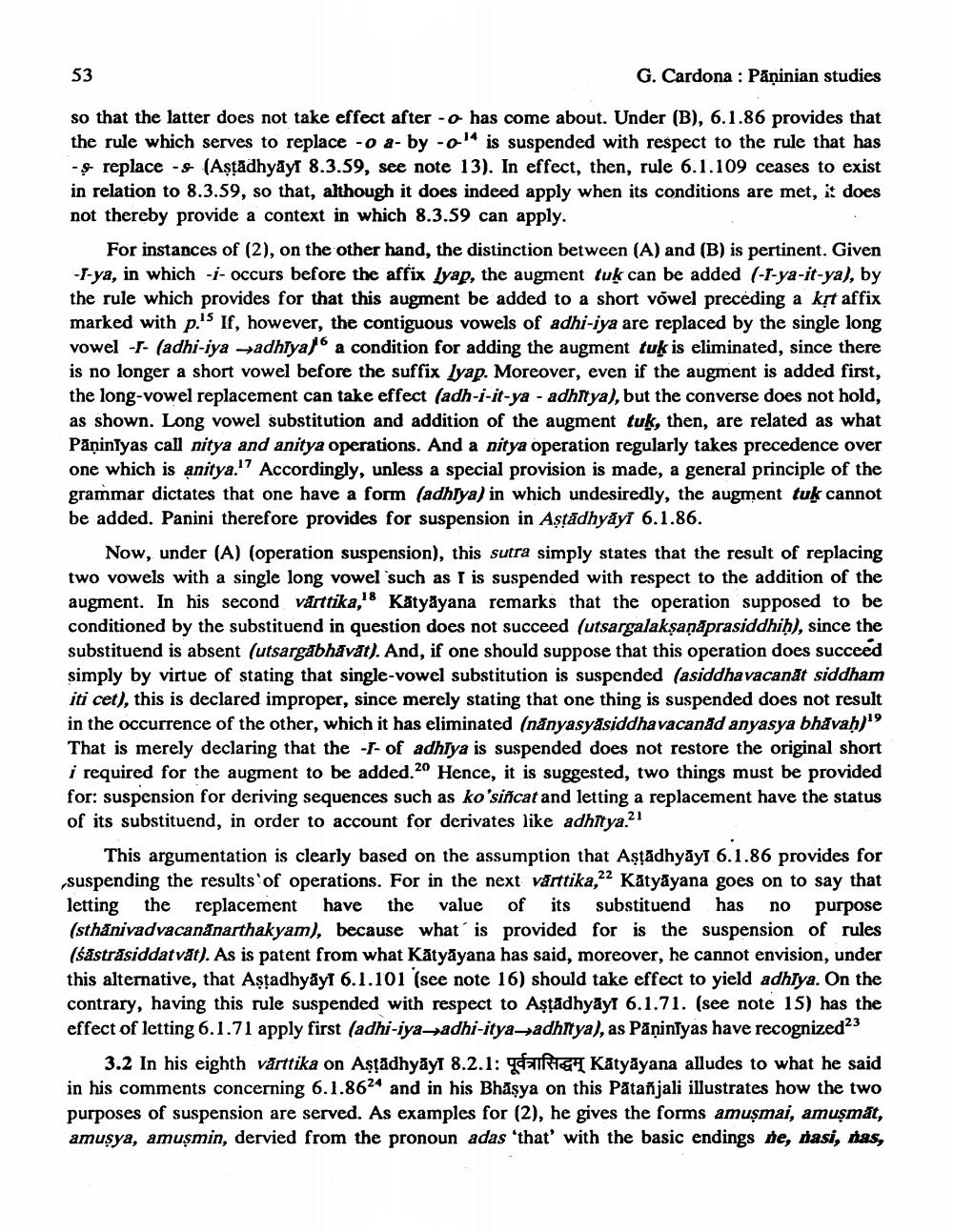________________
53
G. Cardona : Paninian studies so that the latter does not take effect after -o has come about. Under (B), 6.1.86 provides that the rule which serves to replace -o a- by -o-1 is suspended with respect to the rule that has -replace- (Aṣṭadhyay 8.3.59, see note 13). In effect, then, rule 6.1.109 ceases to exist in relation to 8.3.59, so that, although it does indeed apply when its conditions are met, it does not thereby provide a context in which 8.3.59 can apply.
For instances of (2), on the other hand, the distinction between (A) and (B) is pertinent. Given -T-ya, in which -i- occurs before the affix yap, the augment fuk can be added (-T-ya-it-ya), by the rule which provides for that this augment be added to a short vowel preceding a kṛt affix marked with p.' If, however, the contiguous vowels of adhi-iya are replaced by the single long vowel -I- (adhi-iya-adhlyaf a condition for adding the augment tuk is eliminated, since there is no longer a short vowel before the suffix lyap. Moreover, even if the augment is added first, the long-vowel replacement can take effect (adh-i-it-ya- adhitya), but the converse does not hold, as shown. Long vowel substitution and addition of the augment tuk, then, are related as what Paniniyas call nitya and anitya operations. And a nitya operation regularly takes precedence over one which is anitya." Accordingly, unless a special provision is made, a general principle of the grammar dictates that one have a form (adhlya) in which undesiredly, the augment tuk cannot be added. Panini therefore provides for suspension in Aṣṭadhyay 6.1.86.
Now, under (A) (operation suspension), this sutra simply states that the result of replacing two vowels with a single long vowel such as I is suspended with respect to the addition of the augment. In his second värttika," Katyayana remarks that the operation supposed to be conditioned by the substituend in question does not succeed (utsargalakṣaṇāprasiddhiḥ), since the substituend is absent (utsargabhävät). And, if one should suppose that this operation does succeed simply by virtue of stating that single-vowel substitution is suspended (asiddhavacanāt siddham iti cet), this is declared improper, since merely stating that one thing is suspended does not result in the occurrence of the other, which it has eliminated (nanyasyasiddhavacanãd anyasya bhavaḥ)1 That is merely declaring that the -- of adhiya is suspended does not restore the original short í required for the augment to be added. 20 Hence, it is suggested, two things must be provided for: suspension for deriving sequences such as ko'sificat and letting a replacement have the status of its substituend, in order to account for derivates like adhitya.21
This argumentation is clearly based on the assumption that Aṣṭādhyāyī 6.1.86 provides for suspending the results of operations. For in the next värttika,22 Katyayana goes on to say that letting the replacement have the value of its substituend has no purpose (sthanivadvacananarthakyam), because what is provided for is the suspension of rules (sasträsiddatvät). As is patent from what Katyāyana has said, moreover, he cannot envision, under this alternative, that Aṣṭadhyay 6.1.101 (see note 16) should take effect to yield adhiya. On the contrary, having this rule suspended with respect to Aştädhyay 6.1.71. (see note 15) has the effect of letting 6.1.71 apply first (adhi-iya-adhi-itya-adhitya), as Paniniyas have recognized13 Katyayana alludes to what he said in his comments concerning 6.1.863 and in his Bhasya on this Patanjali illustrates how the two purposes of suspension are served. As examples for (2), he gives the forms amuṣmai, amuṣmāt, amusya, amușmin, dervied from the pronoun adas 'that' with the basic endings ne, nasi, nas,
3.2 In his eighth värttika on Aṣṭādhyay 8.2.1:




